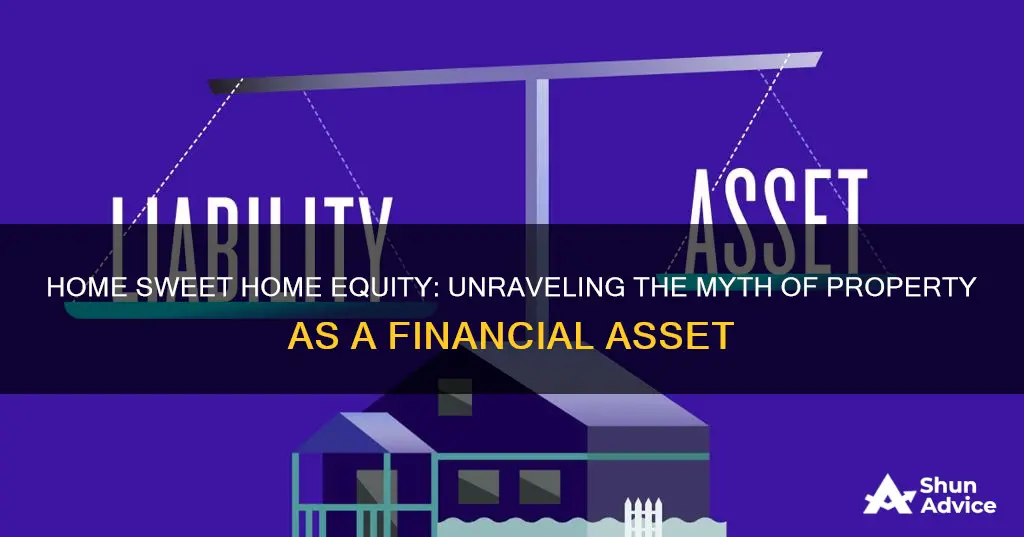
There is much debate about whether buying a house is considered an investment or a financial asset. Some people argue that a house is not an asset because it does not put money in your pocket and does not generate cash flow. Instead, it is a liability because it takes money out of your pocket in the form of a mortgage, taxes, insurance, and maintenance costs. However, others argue that a house is an asset because it has value and can be used to build wealth. The traditional definition of an asset is anything that has current or future economic value, and in this sense, a house is an asset. So, while a house may not be an investment in the same way that stocks or bonds are, it can still be considered an asset.
What You'll Learn

A house is not an asset, it's an expense
There is a common misconception that a house is an asset, but this is not the case. A house is an expense, not an asset. The primary purpose of a house is to provide you with a place to live, and it's not something you can do without. Therefore, it's considered a liability. Every month, you pay expenses on the house, and it doesn't generate any income for you. It's a place of shelter for you and your family, but it's not an investment.
The idea that a house is an asset stems from the fact that real estate values tend to increase over time. However, the prospect of an increase in value alone does not make a house an investment. For a house to be considered an investment, you would need to plan to sell it and profit from the increase in value. But selling your house means finding another place to live, and using the equity from the sale to fund that purchase, which can be challenging.
Additionally, the carrying costs of owning a home are too high for it to be considered an investment. When you purchase an investment, you typically don't need to put more money into it for it to make a profit. In contrast, when you own a home, you have to make monthly mortgage payments, pay real estate taxes, insurance, and utilities. There are also maintenance and repair costs, which can be significant. All of these expenses add up, and the math doesn't support the idea of a house as a winning investment.
A house can only be considered an asset if it generates income, such as through renting it out or using a strategy called "house hacking," where you find a way to cover the cost of your mortgage by renting out extra space. In most cases, however, a primary residence is not an asset because it costs you money instead of generating income.
While homeownership is still a smart financial decision for many, it's important to understand that a house is not an asset but an expense. It's a place to live and should be viewed as such, with any potential profit from a future sale being considered a bonus rather than the primary purpose of owning a home.
Smart Places to Invest $30K Today
You may want to see also

A house is not an investment, it's a primary residence
While buying a house can be a good financial decision, it is not an investment or financial asset. A house is a primary residence, a place to live, and it is illiquid. It is not something you can do without, and you will have little control over its sale.
A house is not an asset because it does not give a boost to your bottom line but instead creates additional expenses. These expenses include maintenance, compounding interest over the life of a mortgage, and "carrying costs" such as real estate taxes, homeowner's insurance, and utilities. All these costs mean that a house is a liability, not an asset.
Even when a house appreciates in value, this does not make it an investment. The prospect of an increase in value alone is not enough to make a house a true investment. The only way to profit from this increase is to sell the house, and then you will have to find another place to live. If you do not sell, you are not making a profit.
If you want to invest in real estate, it is better to buy a second home as a rental property. This way, you can generate income from rent and build wealth.
In summary, a house is a lifestyle purchase, not an investment.
Mortgage or Super: Where Should Your Money Go?
You may want to see also

A house does not generate cash flow
A house is not a financial asset. Financial assets are liquid assets that derive their value from a contractual right or ownership claim. They include stocks, bonds, cash, and bank deposits.
The prospect of an increase in a house's value is not enough to make it a true investment. Historically, real estate values tend to increase over time, and a house purchased for $250,000 in 2020 may be worth $350,000 in 2023. However, the only way to profit from this increase is to sell the house, and selling your house means you'll have to find another place to live. If you use the equity from the sale to fund the purchase of another house, your equity is "trapped," and you won't make a profit unless you downgrade to a less expensive house or move to a rental.
Additionally, the carrying costs of owning a home are too high for it to be considered an investment. When you purchase an investment, you typically don't need to put more money into it for it to make money for you. However, when you own a home, you have to make monthly mortgage payments, pay real estate taxes, homeowners insurance, and utilities. There are also maintenance and repair costs to consider, which can cost thousands of dollars. These carrying costs can quickly add up and eat into any potential profit from the sale of the house.
Furthermore, equating your house to an investment can lead to equity stripping. You can borrow money against the equity in your house, but this creates a corresponding liability and puts your house at risk. Many people learned this the hard way during the financial crisis when they realized they had no equity in their homes and were unable to refinance or sell.
In conclusion, while a house can be a useful tool for building wealth and stabilizing your long-term financial well-being, it does not generate cash flow and is not considered a financial asset.
Quarterly Payouts: Exploring Investments with Regular Dividend Schedules
You may want to see also

A house is a liability because it takes money out of your pocket
There is an ongoing debate about whether a house is a financial asset or a liability. While some people consider a house to be an asset, others argue that it is a liability because of the expenses involved in owning one. Here are some reasons why a house can be considered a liability:
Maintenance and Repair Costs
Owning a house comes with ongoing maintenance and repair costs. These expenses can add up quickly and eat into any potential profits from a future sale. Examples of such costs include replacing the roof, siding, windows, doors, carpets, and flooring, as well as remodelling kitchens and bathrooms. These expenses are often referred to as "carrying costs" and can cost thousands of dollars.
Opportunity Cost
When you buy a house, you are essentially prepaying the money you would have spent on rent during the period of ownership. This prepayment could have been invested elsewhere and generated a return. Therefore, the opportunity cost of owning a house is the potential return that could have been earned on the money tied up in the house.
Limited Liquidity
Houses are not as liquid as other assets, such as stocks or bonds. Selling a house can be a time-consuming and costly process, especially if the real estate market is experiencing a downturn. Additionally, there may be sentimental value attached to the house, making it difficult to part with.
High Carrying Costs
Owning a house typically involves various carrying costs, such as monthly mortgage payments, real estate taxes, homeowner's insurance, private mortgage insurance, and utilities. These expenses can be significant and ongoing, reducing the cash flow available for other investments or expenses.
Lack of Control Over Sale Timing
As a primary residence, a house serves the essential purpose of providing shelter. Therefore, the decision to sell it is often driven by lifestyle changes rather than investment returns. This lack of control over the sale timing can result in selling the house at a suboptimal time from an investment perspective, potentially leading to negative returns.
In conclusion, while a house can provide stability and the opportunity to build equity, it is important to recognise that it can also be a liability that takes money out of your pocket. The expenses associated with homeownership, including maintenance, repairs, taxes, insurance, and utilities, can add up significantly over time. Therefore, it is crucial to carefully consider the financial commitments involved before purchasing a house.
AGNC Investment Dividends: Payout Patterns and Frequency
You may want to see also

A house is a financial asset because it has contractual rights
There is some debate around whether or not a house is a financial asset. A financial asset is a liquid asset that gets its value from a contractual right or ownership claim.
A house is not a liquid asset, as it cannot be easily converted into cash. However, it can be argued that a house is a financial asset because it has contractual rights. When you buy a house, you enter into a contract that gives you the right to occupy and use the property. This contractual right can be seen as a financial asset, as it has economic value and can provide future benefits to the owner.
Additionally, a house can be considered a financial asset because it can be used as collateral for loans or mortgages. The equity in a house can be accessed through loans or lines of credit, which can provide financial flexibility and opportunities for investment.
However, it is important to note that a primary residence is often considered an expense rather than an asset. This is because the maintenance and carrying costs of owning a home can create a liability, and the opportunity cost of ownership should also be considered.
In conclusion, while a house may have some characteristics of a financial asset due to its contractual rights and potential for collateral, it is not a liquid asset and may be more accurately classified as an expense for the owner.
Market Volatility: Should You Invest Now?
You may want to see also
Frequently asked questions
A house is not a financial asset. Financial assets are liquid assets that derive their value from a contractual claim on an underlying asset. A house is a physical, illiquid asset.
A house is not an investment because its primary purpose is to provide you with a place to live. You will have little control over its sale from an investment perspective.
An asset is anything that has current or future economic value. An investment is a type of asset that is purchased with the expectation that it will generate income or appreciate in value.







